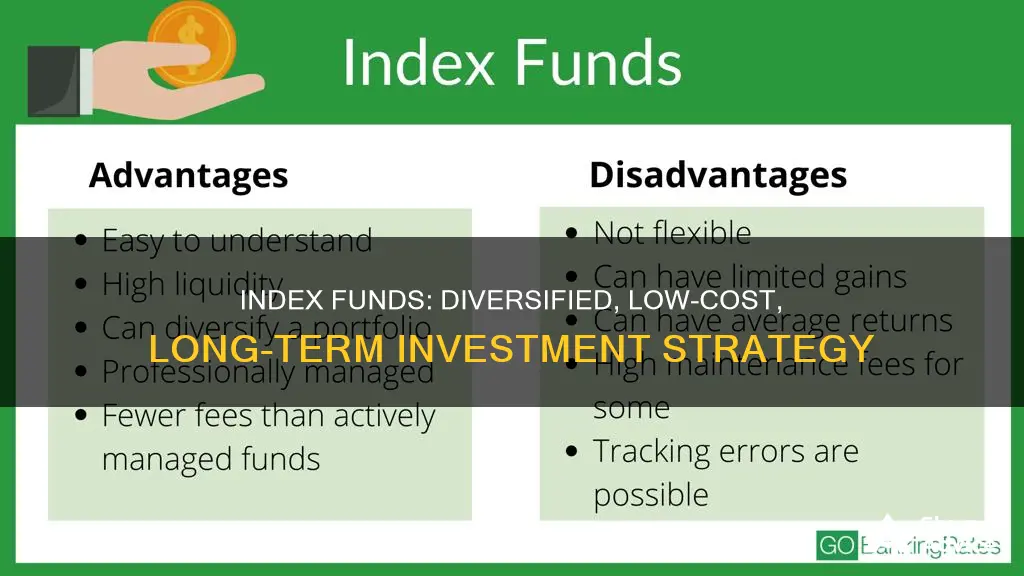
Index funds are a great investment option for building wealth over the long term. They are a type of mutual fund or exchange-traded fund (ETF) that aims to mirror the performance of a specific market index, such as the S&P 500 or the Dow Jones Industrial Average. By investing in an index fund, you instantly diversify your portfolio, reducing the risk of losing money. Index funds also tend to have lower fees and generate attractive returns, outperforming other types of funds over time. They are a passive investment strategy, meaning they don't require active management, which further reduces costs. Overall, index funds offer a low-cost, easy way to invest and build wealth, making them a popular choice for retirement investors.
| Characteristics | Values |
|---|---|
| Affordability | Low fees |
| Broad diversification | Low risk |
| Performance | Attractive returns |
| Passive investment | No downside protection |
| Tax advantages | Cannot trim underperformers |

Low fees
Index funds are a great investment option for those seeking a low-fee investment strategy. These funds are passively managed, meaning they aim to mirror the performance of a particular market index, such as the S&P 500, without actively trading individual stocks. This passive management style results in significantly lower fees compared to actively managed funds.
The fees associated with index funds are an important consideration when evaluating investment options. Actively managed funds typically have higher expense ratios, which are fees charged as a percentage of the fund's assets, to cover the cost of active management. In contrast, index funds have much lower expense ratios, typically ranging from 0.05% to 0.07%, with some funds offering ratios as low as 0%. This means that for every $10,000 invested in an index fund with a 0.05% expense ratio, you would pay just $5 in management fees annually.
The low fees of index funds are a result of their passive management style. Index funds simply track a specific market index by buying and holding all the stocks in that index, with minimal turnover. This passive approach eliminates the need for costly portfolio managers who actively trade stocks in an attempt to outperform the market. As a result, index funds have much lower management fees, also known as expense ratios, than actively managed funds.
In addition to lower expense ratios, index funds also benefit from lower transaction costs due to their buy-and-hold strategy. Actively managed funds, on the other hand, frequently trade stocks, resulting in higher transaction costs that can eat into investment returns. By holding investments until the underlying index changes, index funds minimise these transaction costs, maximising returns for investors.
The low fees associated with index funds can have a significant impact on investment returns over time. As investing icon Warren Buffett noted, "Costs really matter in investments... [high fees] make an enormous difference in how much money you're going to have in retirement." By choosing index funds with low fees, investors can keep more of their investment returns, potentially resulting in greater wealth accumulation over the long term.
Overall, the low fees associated with index funds make them an attractive investment option. The passive management style of index funds minimises fees, maximises returns, and provides investors with a simple and cost-effective way to invest in the stock market.
Index Funds vs Savings: Where Should Your Money Go?
You may want to see also

Broad diversification
Index funds are a great way to achieve broad diversification in your investment portfolio. Diversification is an important strategy to minimise risk and protect your money. By investing in an index fund, you can instantly diversify your portfolio by investing in a large number of different stocks. For example, an index fund that tracks the S&P 500 would hold around 500 different stocks. This means that the performance of your portfolio is not overly dependent on the fortunes of any one company. If one company performs poorly, this will be balanced out by the performance of the other companies in the index fund.
Index funds are also a more affordable way to achieve diversification compared to other types of funds. Because index funds are passively managed (i.e. they simply track an index rather than actively trading), the management fees are much lower. While actively managed funds often have expense ratios ranging from 1% to 2%, index funds typically have expense ratios of 0.05% to 0.07%, and some have no expense ratio at all. This means that more of your money is going towards your investments rather than fees.
Index funds also have a lower turnover ratio compared to actively managed funds. This means that they buy and sell stocks less frequently, resulting in lower transaction costs and fewer capital gains taxes for the investor.
In addition to broad diversification, index funds offer other benefits such as low costs, tax advantages, and low risk. They are a great option for long-term wealth building, especially for retirement investors. By investing in an index fund, you can achieve broad diversification and minimise risk, while still benefiting from the overall growth of the stock market over time.
Mutual Funds: Risky Business and Why You Should Avoid
You may want to see also

Low risk
Index funds are a great investment option for those seeking a low-risk way to build wealth over time. Here are some reasons why investing in index funds is considered a low-risk move:
Diversification
Index funds provide instant diversification, reducing the likelihood of losing money. By investing in an index fund, you gain exposure to a wide range of companies across different sectors and industries. For example, an index fund tracking the S&P 500 would hold about 500 different stocks. This diversification ensures that your portfolio's performance is not overly dependent on the fortunes of any single company.
Low Fees and Costs
Index funds are known for their low fees and costs, which can save investors significant amounts of money in the long term. They have lower management fees compared to actively managed funds because they are passively managed. Index funds simply mirror the performance of a particular index, requiring less active decision-making and trading. As a result, the expense ratios of index funds are typically much lower than those of actively managed funds.
Tax Advantages
Index funds also offer tax advantages. They generate less taxable income due to their lower turnover ratios. Since index funds buy and hold stocks for the long term, they incur lower capital gains taxes, resulting in lower taxes owed by the fund's investors. Additionally, index funds have the flexibility to choose from various lots when selling a particular security, allowing them to sell the lots with the lowest capital gains and, consequently, the lowest tax liability.
Historical Performance
Historically, index funds have performed well over time. The S&P 500, for instance, has generated an average annual return of nearly 10% over the years. While past performance does not guarantee future results, the long-term upward trend of the stock market makes index funds a relatively safe bet for investors.
Recommended by Experts
Warren Buffett, one of the most successful investors of all time, has consistently recommended low-cost index funds as a smart investment choice. In a letter to shareholders, Buffett emphasised the importance of minimising fees, stating, "When trillions of dollars are managed by Wall Streeters charging high fees, it will usually be the managers who reap outsized profits, not the clients."
NHCU's Investment Strategies: Where Are Funds Allocated?
You may want to see also

Passive investing
Index investing is a form of passive investing. This means that investors don't need to actively manage their stocks and bonds as closely as they would with other types of investments. This is because the fund simply copies a particular index, such as the S&P 500 or the Nasdaq 100.
Index funds are considered a passive investment strategy because they don't require investors to actively decide which investments to buy or sell. Instead, index funds aim to mirror the performance of a chosen index as closely as possible. This is done by holding all or a representative sample of the securities in that index. For example, an index fund tracking the S&P 500 would hold approximately 500 different stocks.
Secondly, index funds tend to have lower costs than other types of investments. These include lower management fees, also known as expense ratios, as index funds are passively managed and do not require active trading decisions. Additionally, index funds have lower transaction costs since they hold investments for longer periods without frequently trading in and out of securities.
Finally, index funds have historically generated attractive returns over time. This is because the overall stock market tends to increase in value over time, and index funds aim to match the performance of the market. According to research, only about 23% of actively managed funds outperform the S&P 500 over a five-year period.
In summary, passive investing through index funds offers investors a simple and cost-effective way to diversify their portfolios, potentially generate attractive returns, and benefit from the long-term growth of the overall stock market.
Choosing a Fund: Key Factors for Smart Investing
You may want to see also

Long-term performance
Index funds are a great investment for long-term performance. They are a low-cost, easy way to build wealth over time, making them a popular choice for retirement investors.
Index funds are a type of mutual fund or exchange-traded fund (ETF) that tracks the performance of a market index, such as the S&P 500 or the Dow Jones Industrial Average. They are designed to be simple, all-in-one investments that provide instant diversification at a low cost. By investing in an index fund, you own a small piece of all the stocks in a particular market index. This means that your investments are tied to the performance of a wide range of companies, which reduces the risk of losing some or all of your money.
Over time, index funds have consistently outperformed other types of funds in terms of total return. One of the main reasons for this is their low management fees. Index funds are passively managed, which means they don't require a manager to actively trade the fund or a research team to analyse securities and make recommendations. Instead, the fund simply duplicates the portfolio of its designated index. This passive management strategy also means that index funds are less work for the investor, as they don't need to actively decide which investments to buy or sell.
Index funds also have lower transaction costs than other types of funds. They hold investments until the index itself changes, which doesn't happen very often, and they trade in and out of securities less frequently. These lower costs can make a big difference to your returns over time. As investing icon Warren Buffett said, "Costs really matter in investments... If returns are going to be seven or 8% and you're paying 1% for fees, that makes an enormous difference in how much money you're going to have in retirement."
In addition to lower fees, index funds also offer tax advantages. Because they buy new lots of securities whenever investors put money into the fund, they have hundreds or thousands of lots to choose from when selling a particular security. This means they can sell the lots with the lowest capital gains and, therefore, the lowest tax bite. Index funds also generate less taxable income overall, as they trade in and out of securities less frequently than actively managed funds.
When it comes to long-term performance, index funds are a smart choice for investors. They offer instant diversification, low fees, and tax advantages, all while providing strong returns over time.
Investing Now: Choosing the Right Funds for Your Portfolio
You may want to see also
Frequently asked questions
Index funds are considered one of the smartest types of investments because they are affordable, enable diversification, and tend to generate attractive returns over time. They are also easy to invest in, have low fees, and often perform very well.
Index funds are investment funds that follow a benchmark index, such as the S&P 500 or the Nasdaq 100. When you put money in an index fund, that cash is then used to invest in all the companies that make up the particular index, which gives you a more diverse portfolio than if you were buying individual stocks.
Index funds tend to be less expensive for investors than actively managed funds because they are passively managed. They also typically make trades less often, which leads to fewer fees and lower taxes. In addition, index funds tend to perform better over the long term, making them ideal for people investing for retirement.







